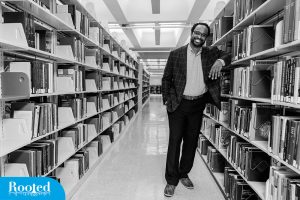Travis Albritton has been contributing to research at Carolina for 15 years.

Travis Albritton has worked for UNC-Chapel Hill for 15 years in a variety of roles, most recently as associate dean for diversity, equity, and inclusion in the School of Social Work (SSW). He is also chairperson for the school’s diversity committee and director of the Chapel Hill Three-Year MSW Program.
What brought you to Carolina?
In 2001, I became a graduate student in the School of Social work. I fell in love with Carolina and knew that if I had the opportunity to return as a faculty member I would do so. After graduation, I remained in touch with several professors, and when the directorship of the Chapel Hill Three-Year MSW Program opened, I applied for the position and returned to the school in 2008.
How has your role here changed over the years?
Since joining the faculty, I have had the opportunity to work with students in a variety of capacities. I still direct the Three-Year MSW Program and have progressively taken on more responsibilities. I have taught courses in both our generalist and specialization curriculum and have served as an advisor and instructor for students in field placements. In 2018, I was appointed as the school’s inaugural associate dean for diversity, equity, and inclusion.
In my role as associate dean, I serve on the dean’s senior executive council and am responsible for coordinating the school’s diversity, equity, and inclusion efforts. I also represent SSW as a member of the University’s Diversity, Equity, and Inclusion Council, which is a group of senior diversity leaders from units across the larger campus community who serve as an advisory and recommending body to the chief diversity officer.
Most recently, I joined SSW’s National Initiative for Trauma Education and Workforce Development (NITEWD) as a co-investigator for a five-year, $3 million demonstration project from the Substance Abuse and Mental Health Services Administration. The initiative focuses on building capacity among mental health clinicians to serve traumatized youth and families. In my role, I address health disparities regarding access to evidence-based trauma treatments for Black and Indigenous People of Color. Specifically, I collaborate with the team to strategically incorporate an anti-racist and anti-oppression framework into educational intervention materials used to train clinicians and social work educators.
What’s kept you at Carolina?
As a Carolina alumnus, I have a deep love for the University. The School of Social Work played a critical role in my professional growth and development and the work of our faculty and students often aligns with my personal beliefs and values. I also enjoy meeting new students and having the opportunity to educate the next generation of social workers. As a native North Carolinian, I know how much the University means to the state, and I consider it a privilege to be part of such a wonderful institution.
I also have the privilege of belonging to one of the top schools of social work in the country. I have wonderful colleagues who are engaged in cutting-edge research, and the school attracts bright students who challenge me to be my best every time I step into the classroom.
What contribution are you most proud of?
I’m most proud of the work I have done with my colleagues to ensure that we are addressing important issues related to equity, justice, and anti-oppression in our curriculum. Several years ago, we began integrating more critical theories into our generalist courses, and the process of engaging in such curricula development has been one of the highlights of my role as associate dean for diversity, equity, and inclusion.
Another great joy of mine was helping launch the SSW Summer Reading Initiative almost four years ago. Each year we select a new book to engage students in conversations related to equity and justice. The book serves as a common reference point for first-year MSW students as they collectively explore and discuss the kinds of complex problems that social workers address at individual and community levels.
What is a uniquely Carolina experience you’ve had?
A few years ago, I was asked to help select speakers for SSW’s Centennial Speaker Series. I had the opportunity to interview each speaker about critical topics impacting our nation, and the conversations were very impactful. I was happy to lead each discussion and have nationally known thought leaders share their insights with the school and the larger Carolina community.
Rooted recognizes long-standing members of the UNC-Chapel Hill community who have aided in the advancement of research by staying at Carolina. They are crucial to the UNC Research enterprise, experts in their fields, and loyal Tar Heels. Know someone we should feature? Nominate a researcher.
